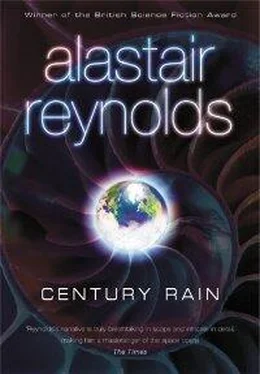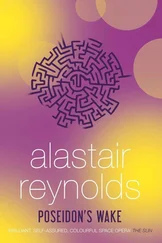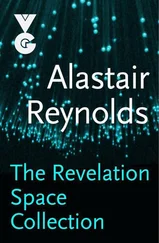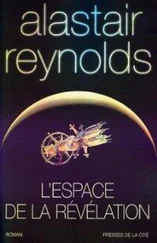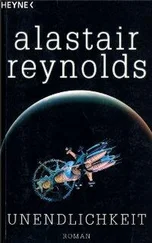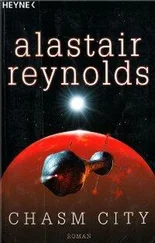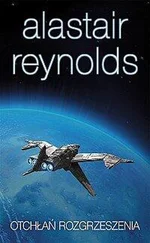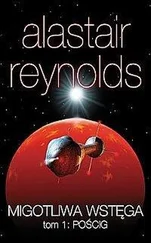That shiver of excitement had now become a full-blown tingle, lifting up every hair on the back of Auger’s neck. “So what did they do?” she asked impatiently.
“They shipped the information back through the portal. Niagara’s boys got their hands on it and did all the clever stuff on the other side.”
“So there’s something encoded in the music?” Auger asked.
“Someone’s been flooding Paris with cheap bootlegs,” Floyd said. “It’s been going on for months. Now we know why.”
“You can’t be sure there’s a connection,” she said.
“Yes, I can. My old friend Maillol even pointed me to a link between the Blanchard case and his own anti-bootlegging operation. I just couldn’t see how they could possibly be connected at the time.”
“And now you can,” Auger asked.
“Custine spoke to one of Blanchard’s tenants—guy by the name of Rivaud—who’d seen one of your nasty little children hanging around the building. When I tried to talk to Rivaud myself, he’d put on a disappearing act. A few days later, Maillol tells me they found his body floating in the flooded cellar of a warehouse in Montrouge.”
“Nice,” Auger said, wrinkling her nose with distaste.
“It gets nicer. Guy had abrasions on his neck, as if one of those children had been encouraging him to keep his head below water.”
“And the significance of this warehouse?”
“It was the same place Maillol turned up that counterfeit pressing plant.”
“Do you think Rivaud was in on the bootlegging scheme?”
“He might have been,” Floyd said, “but then we’d have to explain the coincidence of him living in the same building where Susan White ended up as a tenant.”
“Big coincidence.”
“Too big. More likely, Rivaud caught sight of one of those children again and decided to do some gumshoe work of his own. Tailed the child all the way back to the warehouse. Maybe he was even lured there, if the children thought he’d seen too much already.”
“Floyd may be on to something,” Tunguska said. “Here. Let me examine that disc.”
“Is that an original?” Auger asked.
“No—it’s a facsimile based on the surface scan of the original made by Cassandra,” Tunguska said. “But it should be accurate enough for our needs, if there’s genuinely latent information buried on it.”
“Take my word for it,” Floyd said, “either that music-killing virus has already found its way into my head or there’s something wrong with that recording.”
“There could be a high-frequency signal encoded in the groove,” Tunguska said. “Enough to hold a significant chunk of that antenna data. I can verify this very quickly—”
“How quickly?” Auger asked, her impatience getting the better of her.
He blinked. “ That quickly. It was just a question of examining Cassandra’s holographic data and looking for something anomalous in the structure. It’s always much easier to identify a pattern if you have some idea of what you’re looking for.”
“And?” she persisted, barely able to keep still in her seat.
“Floyd is correct. There is an additional channel of information imprinted on to this recording. Not enough to render the original music unbearable, but enough to upset someone with Floyd’s refined tastes.” He awarded Floyd a gentle, rather admiring smile. “We’d never have noticed it otherwise.”
Tunguska turned the platter this way and that, admiring the play of light across its reflective black surface. “A thing of beauty, really. But also something of a double-edged sword.”
“We helped them,” Auger said. “We got that information out of Paris, thinking we were saving priceless artefacts.”
“They must have known all about your efforts to smuggle cultural data out of the city,” Tunguska said. “Given that Niagara’s agents needed to smuggle their own data out at the same time, your operation suited their purposes perfectly. All they had to do was bury the information in those recordings and make sure they fell into Susan’s hands. Flooding the market with fakes was by far the simplest option.”
“You know what?” Floyd said. “I wouldn’t be too surprised if the Paris sphere was in that same warehouse complex. Even if Maillol had found it, he wouldn’t have had any idea of its significance.”
“They tricked us,” Auger said, outraged and embarrassed at the same time.
“You mustn’t blame yourself,” Tunguska said sternly. “Thanks to Susan’s efforts, a vast amount of priceless material was saved from Paris. It’s neither your fault nor hers that some of those artefacts were deliberately tainted.”
“But that one disc can’t possibly hold all the information,” Auger said. “We have a box full of records,” Tunguska said. He blinked again: some part of his mind whisking away to sift through Cassandra’s data and her report on it. “It appears that a third of them have a similar microscopic structure. The rest, presumably, are genuine recordings.”
“But we’ve been extracting records ever since we opened the Phobos portal,” Auger said. “That’s hundreds of thousands of recordings.”
“It may not matter,” Tunguska said. “You’ll remember that Niagara was extremely keen to get his hands on the final shipment. It could be that the earlier shipments contained data that was in some way provisional or flawed. They may only just have got their antenna into a properly functioning state. Allowing time to combine the data strands from all three spheres… and to imprint the signals on to these recordings… and to distribute the recordings in such a way that they would fall plausibly into your hands… well, I have no difficulty believing that the final cargo was the most significant.”
“Then we have a chance,” Auger said. “If you can decode that embedded signal, of course.”
“I don’t anticipate huge difficulties,” Tunguska said. “Remember, it would have taken significant computing power to effect a complex encryption, which would have been as problematic for them as interpreting the data on E2 in the first place. I don’t believe the encoding will tax us.”
“I hope you’re right.”
“I’m already merging and processing the data,” he said. “I’ve assigned a significant portion of my ship’s computing resources to the effort. Of course, we could still be chasing shadows—”
“We’re not,” Floyd said firmly.
With a certain reverence, Tunguska slipped the Louis Armstrong record back into its sleeve. “We’re nearly ready for full bleed-drive thrust. We’ll continue on our present heading, taking the most likely portal. Once in transit, we’ll have eight hours to crack the numbers and determine the position of the ALS. It will be difficult—it may even be impossible—but at least it gives us the hope of one more lead against Niagara.”
“You have your uses after all, Floyd,” Auger said.
“Don’t thank me,” Floyd said. “Thank the music. I always said it would save the world.”
It was a little-travelled arm of the hyperweb, one that had seen only sporadic traffic since the Slashers had begun to map the network’s further fringes. Five portals lay close together in a loose, drifting quincunx, separated by no more than a light-second of interstellar space. There were no suns here, no worlds, no rogue moons—not even the rocky fragments of them, unborn or shattered. Only the spired husks of five large comets, dry and dead for billions of years, each of which formed an anchor for a single unmanned portal.
But there was something else. Sensors groped for it in the darkness. It was unthinkably dark, illuminated only by starlight. It was also unthinkably huge: as wide across as the sun itself, with room to spare.
Читать дальше
